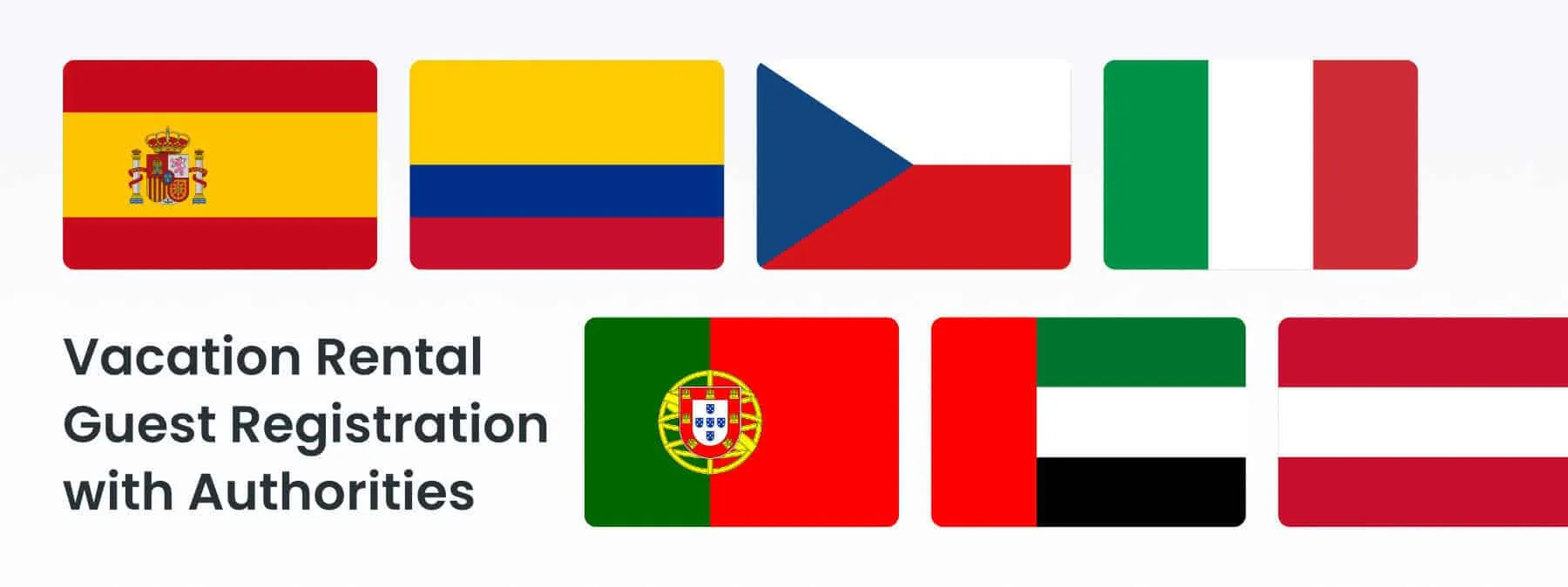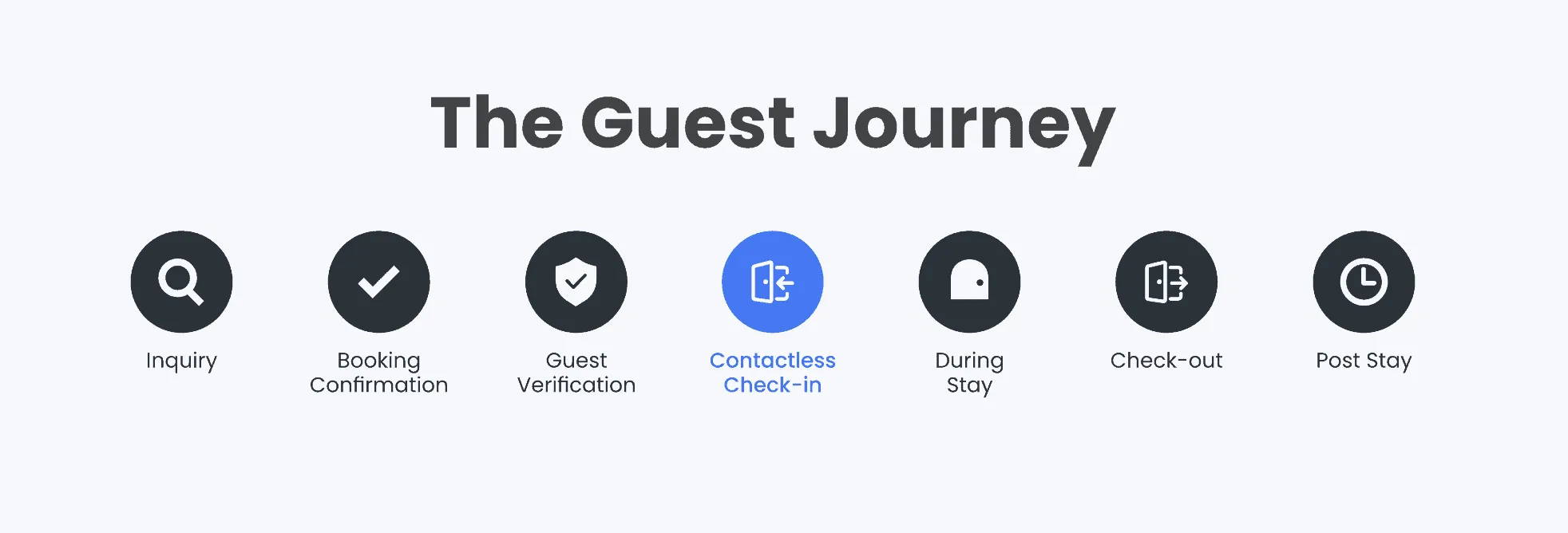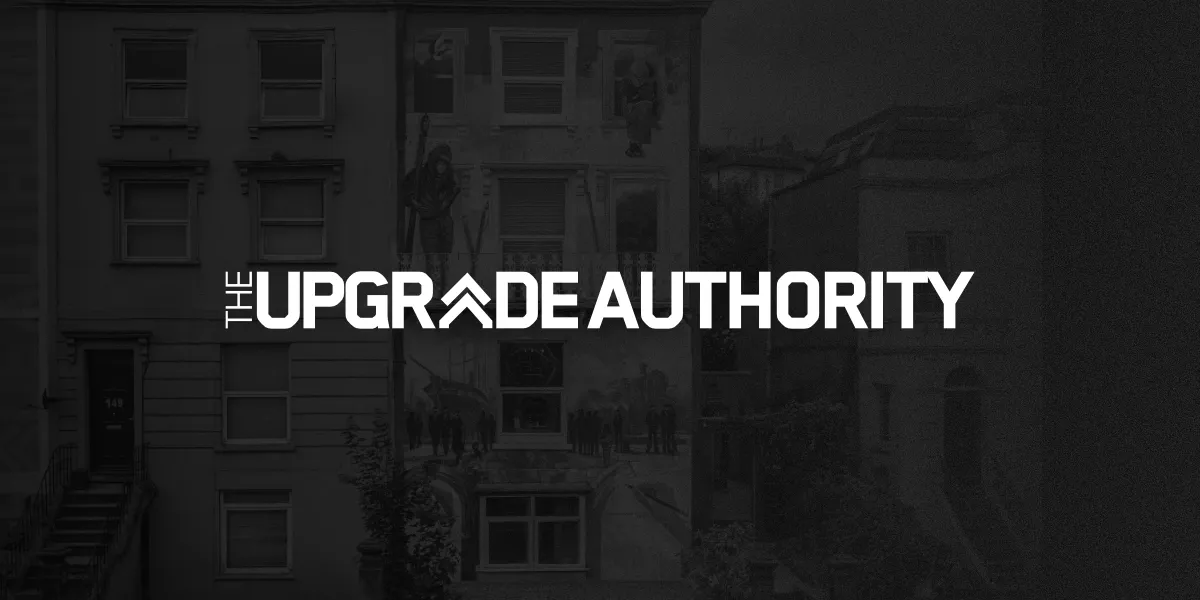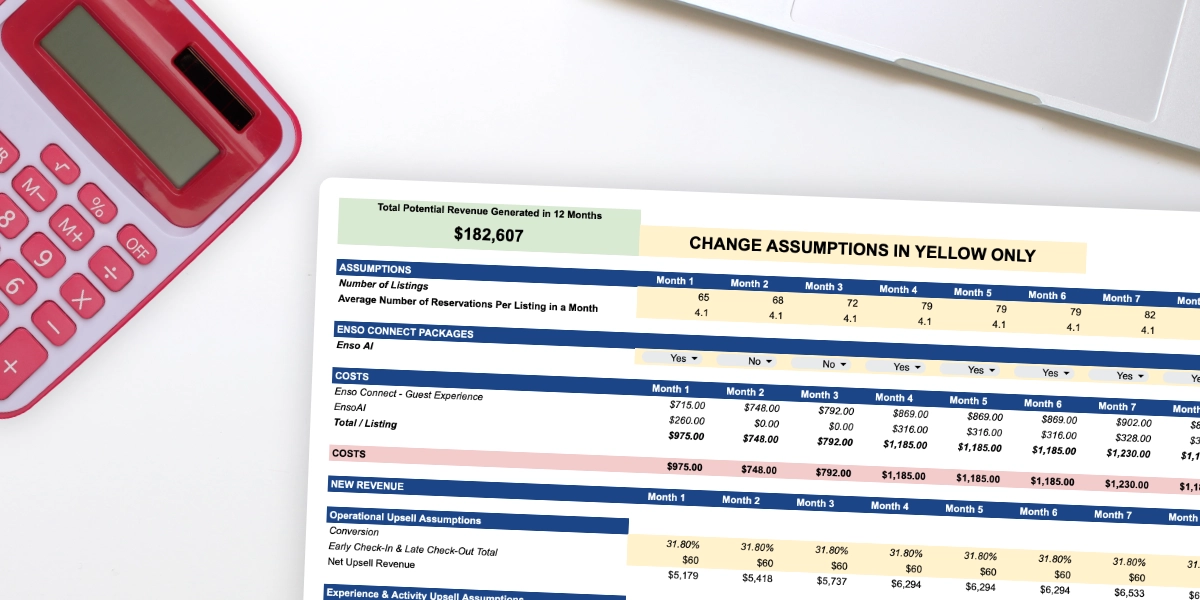The popularity of vacation rentals in Europe is growing steadily among travelers. Both owning and staying at these rentals offer unique experiences and a sense of home away from home. However, this surge in popularity has brought about a need for increased oversight and regulation. This is where the need for guest registration with local authorities comes in.
Guest registration involves hosts providing local authorities with information about the individuals staying in their accommodation facilities, like vacation rentals. It’s a crucial aspect as it helps ensure the safety and security of both the guests and the local community. By having accurate information about who is staying in properties, authorities can:
- respond effectively in case of emergencies,
- monitor for any unlawful activities, and,
- maintain a sense of order in residential areas.
As such, guest registration not only aligns with legal requirements but also contributes to creating a safe and enjoyable environment for everyone involved.
Navigating European Guest Registration With Local Authorities
When hosts engage in the operation of vacation rentals, they take on a significant responsibility that extends beyond merely providing a place to stay. A key aspect of this responsibility is understanding and adhering to local regulations. Compliance with these regulations is crucial, as it ensures that guests can enjoy their stay without concerns about legal complications, and allows hosts to operate their businesses without the stress of potential penalties or disputes.
Furthermore, responsible hosting practices contribute positively to the local community. By following local regulations, hosts help maintain the integrity of the neighborhood, prevent disruptions, and foster positive relationships with residents. This responsible approach supports the sustainability of the vacation rental industry and enhances the overall guest experience.
By staying informed about and compliant with local regulations, hosts can navigate the legal landscape with confidence, ensuring a smooth operation and contributing to a harmonious balance between their business and the community. This proactive stance not only safeguards the host’s interests but also promotes a respectful and enjoyable environment for everyone involved.

What Are the Requirements for Travelers?
In certain EU countries, for short stays of less than 3 months it’s required to report your presence to local authorities soon after arriving, usually at the town hall or police station, and not reporting could lead to fines and expulsion. Typically the reporting is done by accommodation facilities (i.e. hotels, hostels, vacation rentals, campgrounds).
The exact requirements and procedures for reporting presence can vary from country to country within the EU. The general framework and regulations are provided by The Convention Implementing the Schengen Agreement.
EU Countries You Need to Report Your Presence
- Croatia
- Cyprus
- Czechia
- Denmark
- Estonia
- Finland
- Germany
- Ireland
- Italy
- Latvia
- Lithuania
- Luxembourg
- Netherlands
- Romania
- Slovenia
- Spain
- Sweden
Navigating the Guest Registration Process for Hosts
Registering guests for short stays in European countries involves a series of steps that hosts should follow to ensure compliance with European Union Law regulations. It is important to note that Regulation (EU) 2016/679, also known as the General Data Protection Regulation (GDPR) states that organizations and entities processing personal data must guarantee a certain level of data protection and privacy. Individuals must have control over their information.
Although steps can differ by country, here’s a basic outline of the reporting process:
Research Local Regulations
Before hosting guests, it is essential to thoroughly research the specific guest registration requirements for the EU country in which you are operating. Each country has its own set of rules and regulations regarding guest registration, and compliance is crucial for legal operation. Start by visiting official government websites related to tourism, hospitality, or local municipal regulations to gather the necessary information.
Additionally, consider reaching out to relevant local authorities or tourism boards for detailed guidance. They can provide up-to-date information on required documentation, registration procedures, and any additional obligations you might need to fulfill. This proactive approach ensures that you are well-informed about the legal requirements and helps you avoid potential pitfalls.
Understanding and adhering to these regulations not only facilitates a smoother operation but also enhances the overall guest experience by ensuring that all legal aspects are properly managed. Taking these steps before hosting will contribute to a compliant and successful rental operation, while fostering trust and reliability with your guests and local authorities.
Collect Required Information
Gathering the essential information needed for guest registration is a critical step in ensuring compliance with local regulations. This information typically includes guest names, identification details, and contact information. You should also record the duration of their stay and any other specifics that may be required by local authorities.
It’s important to ensure that the identification details are accurate and up-to-date, as this information is often used for verification purposes. Depending on local regulations, you may also need to collect additional details such as nationality, address, or the purpose of the visit.
Having a well-organized system for collecting and storing this information not only helps you stay compliant but also facilitates a smooth check-in process for your guests. By keeping accurate records and adhering to regulatory requirements, you contribute to a secure and professional operation, enhancing both guest satisfaction and your standing with local authorities.

Provide Necessary Forms
Prepare any required forms or documents for guest registration in accordance with the guidelines provided by the local authorities. These forms are essential for ensuring compliance with local regulations and can vary depending on the specific requirements of your region.
Forms and documents might be available for download on official government websites, which often provide the most current and relevant information. Alternatively, you may need to obtain these forms directly from local government offices or tourism boards. Some jurisdictions also offer physical or digital submission options, so be sure to confirm the accepted methods for your area.
Ensure that all required fields are completed accurately and that you adhere to any additional documentation requirements, such as copies of identification or proof of address. Proper preparation and timely submission of these forms will not only help you avoid potential legal issues but also contribute to a smooth and efficient guest registration process.
Communicate with Guests
Before your guests’ arrival, it is crucial to communicate the importance of guest registration and inform them about the required information. Clearly outline the details you will need from them, such as names, identification numbers, and contact information, and explain that this process is a legal requirement.
Provide clear, step-by-step instructions on how they can submit their information. This might include filling out specific forms or providing copies of their identification documents. Consider sending this information in advance via email or a guest portal, and offer assistance if they have any questions or need clarification.
Emphasize that completing this registration is not only a legal obligation but also helps ensure a smooth and efficient check-in process. By proactively addressing these requirements, you can help your guests prepare and comply with the necessary regulations, contributing to a hassle-free arrival experience and maintaining compliance with local laws.
Document Verification
Upon guest arrival, it’s important to thoroughly verify their identification documents and record the necessary information accurately. This step ensures that all legal requirements are met and helps maintain the security of your rental operation.
Carefully check the authenticity of the identification documents provided by the guests. This might include passports, national ID cards, or driver’s licenses, depending on the local regulations. Make sure to capture all required details such as names, identification numbers, and expiration dates.
If regulations require, make copies of their identification documents for your records. Ensure these copies are securely stored and handled in accordance with privacy laws and data protection regulations. Proper documentation and accurate record-keeping are essential for compliance and can prevent potential issues with local authorities.
By diligently verifying and recording guest information, you not only adhere to legal standards but also provide a professional and secure experience for your guests.
Complete Registration
Submit the guest registration forms or information to the relevant local authorities within the specified timeframe to ensure compliance with local regulations. The submission process can vary depending on the jurisdiction and may involve several methods.
You may need to submit physical paperwork in person or via mail to designated government offices or local tourism authorities. In some cases, online submission is required through official government portals or registration platforms. Ensure that you follow the specific instructions provided by local authorities for each method of submission.
If you are using an online platform, double-check that all forms are filled out correctly and that you receive a confirmation of submission. For physical submissions, consider keeping copies of all documents and obtaining a receipt or proof of submission when possible.
Adhering to the submission requirements and deadlines is crucial for avoiding potential penalties and ensuring that your rental operation remains in good standing with local authorities. By managing this process efficiently, you contribute to the legal and professional operation of your short-term rental business.
Keep Records
Maintain a comprehensive record of all guest registration submissions, including the dates of submission and any confirmation or reference numbers provided by the authorities. Keeping detailed documentation is crucial for several reasons.
Firstly, it serves as a personal reference to ensure that all required registrations have been completed and submitted on time. This can be invaluable in case of any future queries or audits by local authorities. Secondly, having a clear record of submissions can help resolve any discrepancies or issues that may arise, providing a clear trail of compliance.
Store these records securely, whether digitally or in physical form, and ensure they are easily accessible if needed. Regularly review and update your documentation practices to maintain accuracy and completeness. By keeping meticulous records, you can effectively manage your compliance obligations and demonstrate your commitment to adhering to local regulations.
Comply with Deadlines
Adhere to any registration deadlines set by local authorities to ensure full compliance with local regulations. Timely registration is crucial, as failing to register guests within the specified timeframe could lead to various consequences, including penalties, fines, or even expulsion from the rental market.
It’s important to keep track of all relevant deadlines and set reminders to avoid missing them. Regularly check for any updates or changes in registration requirements or deadlines from local authorities to stay informed.
By meeting these deadlines, you not only avoid financial repercussions but also demonstrate your commitment to responsible hosting and regulatory compliance. This proactive approach helps maintain the integrity of your rental operation and supports a positive relationship with local officials and the community.
Stay Informed
Stay updated with any changes in regulations that might impact guest registration practices in the future. Regulations can evolve, and staying informed ensures that you remain compliant and avoid any potential issues. Regularly check official sources such as government websites, local tourism boards, or municipal regulations for the latest updates.
Consider subscribing to notifications or newsletters from relevant authorities to receive timely information about changes in registration requirements or deadlines. Engaging with professional associations or industry groups can also provide valuable insights and updates on regulatory changes.
By proactively monitoring and adapting to new regulations, you can maintain smooth operations and uphold the highest standards of compliance. This vigilance not only helps you avoid legal complications but also reinforces your commitment to responsible and professional management of your short-term rental property.
Seek Professional Advice
If you’re unsure about any aspect of guest registration, consider seeking advice from legal professionals, industry associations, or local experts who are familiar with the regulations in your specific European country.
Keep in mind that these steps are general, and details can differ by country. Thoroughly researching and understanding guest registration rules are essential for a successful, compliant hosting experience.
EU Guest Registration and Reporting Examples
Navigating guest registration requirements across the European Union involves understanding the unique practices and regulations of each country. Here are several practical examples of guest registration and reporting procedures in various EU nations.
Catalonia (Region of Spain)
Catalonia has specific regulations that mandate owners to register guests within 24 hours of arrival with Mossos d’Esquadra and collect a tourist tax. Hosts are required to make an appointment online and to submit guest information in person through the Generalitat of Catalonia Mossos d’Esquadra. Failure to register can result in fines.
Czech Republic
Hosts are required to register guests aged 15+ with the local Foreign Police department within three working days of guest’s arrival in the Czech Republic as well as keep a guest registration book. This registration process involves providing guest information and relevant details to the authorities.
Germany
In Germany, a national law mandates that hosts offering short-term accommodations (3 months or less) must gather and retain guest information within 24 hours of arrival. This can be achieved through two methods: buy reporting certificates online or create the certificates independently. For data protection, it’s recommended to erase guest data after a 3-year period.
Netherlands
As per the General Municipal By-Law, The Netherlands requires lodging accommodations to register guests within 24 hours of arrival and a tourist tax to be collected.
Portugal
Guest registration in Portugal involves providing guest information to the Foreigners and Borders Service (SEF) within three (3) business days of arrival. Hosts can submit this information online or in person with registration being free of charge.
Spain
In Spain, it’s required that all visitors aged 16+ provide their information to the Comisaría Local de la Policía Nacional within 24 hours of arrival, either in person or using their online system (which you must be registered to use), and pay a tourist tax. Accommodation establishments, like vacation rentals and hotels, generally handle this process for guests and use a “parte de viajeros” form.
Keep in mind that rules can change, so it’s important to check official sources or local authorities for the latest info before hosting guests. This overview might not cover everything, so it’s important to do detailed research if you’re hosting in these places.
The Importance of Compliance with Guest Registration
Complying with guest registration rules in European countries is not only mandatory to avoid paying fines or being expelled, but it also offers hosts of vacation rentals other significant advantages which can impact their operations and interactions.
Legal Compliance
Following guest registration rules guarantees hosts adhere to the law, crucial to avoid possible fines, penalties, or even halting rental operations and expulsion. Legal compliance provides hosts with peace of mind, allowing them to focus on providing excellent experiences for their guests.
Positive Local Authorities Interactions
When hosts are proactive in following regulations, authorities are more likely to see them as responsible community members. This can lead to positive interactions if hosts need local assistance or clarification about vacation rental operations.
Enhanced Guest Experience
Guests appreciate an organized check-in process with legal registration. Feeling secure and informed boosts overall satisfaction, potentially resulting in return visits, positive reviews and word-of-mouth recommendations.
Community Harmony
Neighbors are more likely to appreciate hosts who operate within the bounds of the law, minimizing any disturbances caused by unchecked or unauthorized rentals. A respectful approach to hosting can lead to a sense of community support and cooperation within the local community.
Easier Taxation and Financial Transparency
Proper guest registration aids hosts in accurately reporting and paying any necessary taxes related to their vacation rental income. This transparency can simplify financial matters and prevent potential tax-related issues in the future.
Adhering to guest registration needs in European countries isn’t just about simple compliance of regulations; it’s about cultivating a good reputation, nurturing community ties, and ensuring a safe, pleasant experience for both hosts and guests. This proactive approach offers many benefits, enhancing the overall success of vacation rental operations.
Try Out The Boarding Pass Instantly and See For Yourself How It Can Improve Your Check-in Process
Get Instant Access To The Boarding PassChallenges You May Encounter
Dealing with guest registration as a vacation rental host can come with its fair share of challenges. It’s important to be aware of these challenges in order to navigate them effectively.
Language Barriers
Hosts may encounter language barriers when trying to understand and communicate guest registration requirements, especially in countries where the official language is different from their own. This can lead to misunderstandings, misinterpretations, and potential errors during the registration process.
Unfamiliar Procedures
Navigating the procedures and processes involved in guest registration can be unfamiliar territory for hosts who are new to the vacation rental industry. Each country may have its own set of rules, forms, and online platforms for registration, which can be overwhelming for hosts trying to comply for the first time.
Varying Requirements
Guest registration requirements can differ significantly from one European country to another. This can be confusing for hosts who operate in multiple locations or for those who have guests from various countries. Keeping up with the varying requirements and staying compliant across different jurisdictions can be challenging.
Administrative Burden
For hosts who manage multiple properties or handle various aspects of their vacation rental business, the administrative workload associated with guest registration can become burdensome. This can include collecting and submitting guest information, keeping track of deadlines, and ensuring accurate reporting.
Technical Challenges
Some countries might require hosts to register guests through online platforms or electronic systems. Hosts who are less tech-savvy or have limited access to reliable internet connections may struggle with using these platforms effectively.
Changes in Regulations
Regulations can change over time, and hosts need to stay updated to remain compliant. However, staying informed about changes in local laws and regulations can be a challenge, especially if the information is not readily available or accessible.
Time Constraints
Guest registration can be time-consuming, especially for hosts who manage multiple properties or have a high turnover of guests. Hosts may find it challenging to balance their time between managing their rentals and fulfilling registration requirements.
Guest Communication
Explaining the guest registration process to guests and collecting the necessary information from them can sometimes be met with resistance or confusion. Guests might not understand the reasons behind the registration and could be hesitant to provide personal information.
It’s important for hosts to be proactive in the face of challenges. This includes using resources like government websites for guest registration info, employing translation tools, seeking local support services, and consulting experienced industry peers familiar with guest registration in their operating country.

Technology Is Making The Guest Registration Process Easier
There are technological tools available to assist hosts in streamlining the guest registration process, such as Enso Connect and its ability to simplify guest registration for hosts, and streamline and monetize your guest journey.
With Enso Connect you can:
- Collect and store guest information seamlessly as part of the booking process, including front of ID, back of ID, and a selfie photo.
- Manage check-ins digitally, pre-filling registration fields.
- Tailor registration forms for local rules, sent before arrival.
- Manage currency and set pricing and charge any local tax or tourist fee.
- Ensure guests understand the purpose of the fee to prevent confusion or conflict.
- Apply custom automations using ‘If This Then That’ logic to personalize and set up fees according to your specific rules.
In guest registration, tech tools like Enso Connect can really help streamline the process. Enso Connect is the solution for hosts, making guest registration easy, compliant, and guest-friendly.

Frequently Asked Questions About Guest Registration
Why is guest registration necessary?
The registration helps authorities track visitors for safety, security, and tax purposes.
What information is required for registration?
Many individuals are curious about the specific details they need to provide during guest registration. This typically includes the guest’s personal information, passport details, length of stay, and the rental property’s address.
Are there any penalties for non-compliance?
People frequently inquire about the potential consequences of not registering their guests. Depending on the country and local regulations, failure to comply with guest registration requirements can lead to fines or legal issues. It’s important to understand and adhere to the local rules to avoid any penalties.
Conclusion
Guest registration plays a pivotal role in the growing popularity of European vacation rentals. It’s not just a legal requirement; it’s a fundamental aspect of responsible hosting that ensures the safety, security, and harmony of both guests and local communities. By sharing essential guest information with local authorities following the GDPR, hosts contribute to effective emergency responses, crime monitoring, and neighborhood order.
While the exact steps can vary depending on the country, the core principles remain consistent. Thoroughly researching local regulations, collecting required guest information, verifying identification documents, and timely submission of registration forms are key elements of the process. Staying informed about any changes in regulations and seeking professional advice when needed are essential to a successful hosting experience.
By taking the responsible path of guest registration, hosts can build credibility, foster positive relationships with local authorities, elevate guest satisfaction, and ensure that their vacation rentals contribute positively to the overall experience of travel in Europe.
How Enso Connect Can Help
Streamline your operations, improve guest experience, and collect the required information to properly register your guests within the EU.
If you’re interested in learning more about Enso Connect, book a demo and one of our team will walk you through the platform!
Maximize your rentals’ potential with ease and no potential legal issues





